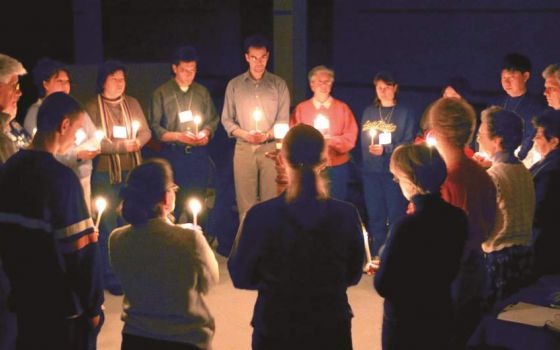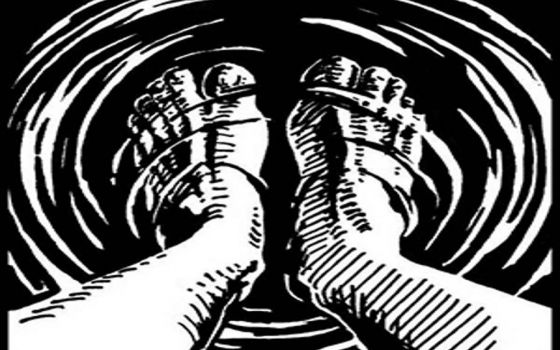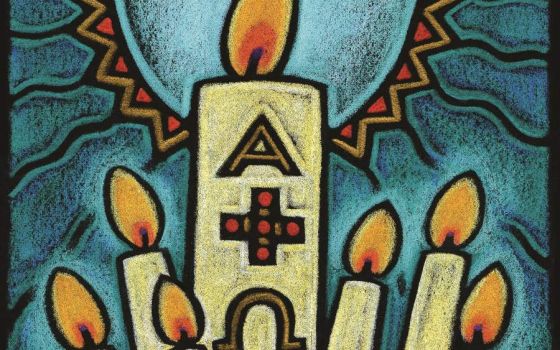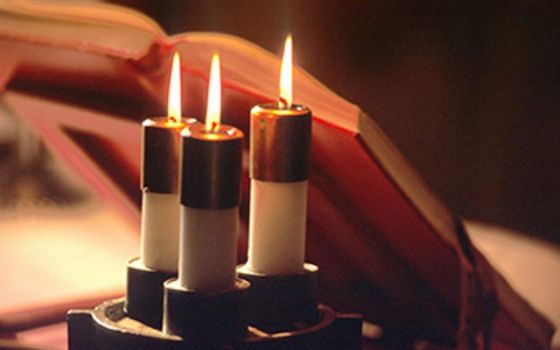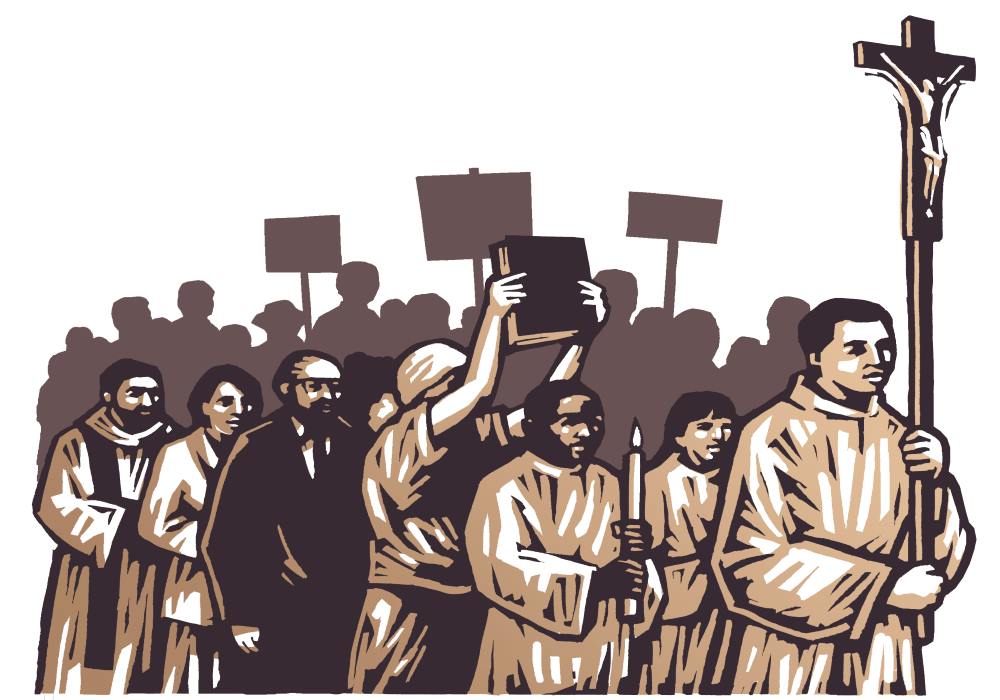
Art by Julie Lonneman
There's this thing about Lent: It's not just a neat six weeks in the spring of the year that gets you all holy and housecleaned in time for Easter. Lent can also creep up behind you and take you by surprise at any point on the calendar of your life. Bam! And life will never be the same again.
OK, mostly I don't want to admit this: First, I don't like Lent. Second, I'm also glad we have those six weeks in spring. Six weeks where I can reach out and embrace the disciplines of a liturgical season and muddle through them, praying, fasting, giving alms. I'm glad for the form and direction they give me in this journey with Christ through death and into a new life. It's a dark journey. It's a tough thing to die to the ego that keeps bobbing up its head and wanting to be saved. I can attend the Wednesday soup suppers at church and the lecture that follows. I can join others in praying the Stations of the Cross or attending Lenten Vespers. I can pick myself out a nice book for Lenten reading. I can cut out wine or chocolate, transforming those good things into something good for others. I can help serve at our Loaves and Fishes outreach. The liturgical celebrations and rituals, the Word during Lent, all of them hold my hand, step by step up to the door of Passion Week and then through the final, holy, transformative actions of Triduum.
I am grateful. I've a lot of Lents under my belt. Still, I always wonder if I've muddled through it well enough, deeply enough. With a whole heart? Will I ever change? I'm grateful, but I haven't loved it! Even after all these years of experience I groan: Have we been transformed YET?
Then out of a clear blue sky there falls a shock. None of us is exempt. There are the collective 9/11s and Katrinas, the earthquakes, the wildfires and tsunamis. There have been plenty of these natural disasters lately. And there are the private ones: A dear friend dies in a horrible accident. A neighbor is killed in ou Gulf War — and another friend loses everything in the floods of our own Gulf. A parent gets Alzheimer's. A divorce we never ever wanted has ripped us apart. Or we ourselves are diagnosed with a cancer for which there is "neither cure nor treatment." Now Lent has descended on our shoulders with all its weight regardless of any date on the calendar. Lent also comes when it will.
Religion, its seasons with its formulas and rituals, with its hard edges of rules and boundaries, is good and right as far as it goes — as long, in fact, as it lures us into the depth of a churning, true spiritual journey. Good and generous liturgy and liturgical action can be a catapult to launch us into change, but too often our symbolic life remains on the level of rules and rubric, bland and without passion or blood in it.
Only recently I watched a young couple bring their baby for baptism. They had arranged for a huge bowl to be present at the front of the church. The baby, naked, was laid across the priest's arms for what was certainly going to be an immersion. And the priest folded the baby in half and dipped the baby's bottom gingerly into the waters. He said "the words," withdrew him and hastily returned him to the waiting arms and towel of the attentive papa. Huh?
I looked around me. No one was touched. There was no collective visceral response. The gesture was puny and stingy and afraid and maybe only "cute." But for this presider, "cute" was good enough. Because the candle the child received was also puny and without lasting girth or power. The parents had prepared a white garment to be presented to the child, clearly ready and aware of its symbolic power — but it was never officially presented! They wrapped the child in the garment on their own, back in their pew. And here's the corker: At the end of Mass, the celebrant then presented the child with a rattle of colored plastic keys — as "keys to the kingdom." How cute. It grieved me deeply for those parents, well prepared and full of hope as they launched their child into deep currents of a life in Christ.
Not many weeks later, there were deep currents of another nature to contend with. Hurricanes hit us in the gut. With a shock that we could hardly fathom, we watched waters come from above and below and wipe out a deep soul and culture that we'd hardly realized was there to appreciate. Waters came to raise up to the surface our collective shadow of prejudice and neglect and we were faced with a new reality: Our shame was also the source of untold art and beauty, identity and soul. Here came a Lent that had nothing to do with the calendar on the wall. These were floodwaters that boiled up and over the container of our religious rituals. These waters meant to catch our attention perhaps because simply "maintaining" our religious rubrics was just a cozy routine that made us feel safe and right and religious. Oh — and weren't the papal rituals of one pope's death and burial and the election of the next a fascinating preoccupation? A place to underscore one's identity? But what did any of that have to do with transformation?
Advertisement
It seems when we are finally hit where we live, collectively and personally with the Lent that falls on us out of the blue — this is where the rubber hits the spiritual road. When we have to change and don't really want to — that's the real conversion. And it's not just taking the leftovers of a broken marriage and moving into a pinched little condo. Or realizing that a spouse you knew and loved is now a stranger in your own home, with Alzheimer's. Or clearing out the belongings of a beloved child, now taken from you forever. Or seeing every last cent of your savings spirited away by some mysterious move of an "expert in his field." Or being let go by the firm where you have been faithful and creative for years, and out you go as though swept away with the trash. There still must come the transformation of the heart: acceptance. Suddenly we are swung out over the abyss where our childhood ideas of God and law and "fairness" no longer hold us up underfoot. All the rituals and exercises, the rules and requirements are, in fact, not the ultimate in the spiritual life. Strung out over the bottomless pit, we look down into what must become our first plunge into the faith of an adult.
We had thought ourselves obedient and right-headed. In some kind of dogged following of perfection, we thought God would keep us from disasters and wrap us in blessing. Effort! we cry. Don't we get credit for effort? But we are hanging out over the abyss where phrases like "dark night of the soul" echo off the distant cliffs.
Hung out. Pulled in two directions. No, four directions. Stretched. Nailed, in fact, to a dawning realization that God does provide for the needs of all creation. So, too, God provides for us. There is hope in the midst of this dying. There is faith when you cannot see the horizon. Abandoned by all, I am surrounded by loving friends. There comes this flicker of light in the great darkness. Light of Christ. The floodwaters invite me to pass through and be dry. Now opposites meet, mingle and do not cancel each other out. New fire is plunged into blessed water and they enhance each other. Death means new life. The End means a new beginning. Thanks be to God.
So. Every year we celebrate the collective path of Lent when the calendar presents it, our elbows linked, praying, fasting and working for social justice and for that elusive peace. That exercise will bring us courage. That exercise will tell us each handhold to grip in the darkness. That holy season will allow us to know the edges and contours on the map of our own spiritual journey. Our road through suffering and death. Our own resurrection to new life in Christ.
Editor's note: This reflection was originally published in the March 2006 issue of Celebration. Sign up to receive daily Lenten reflections.




